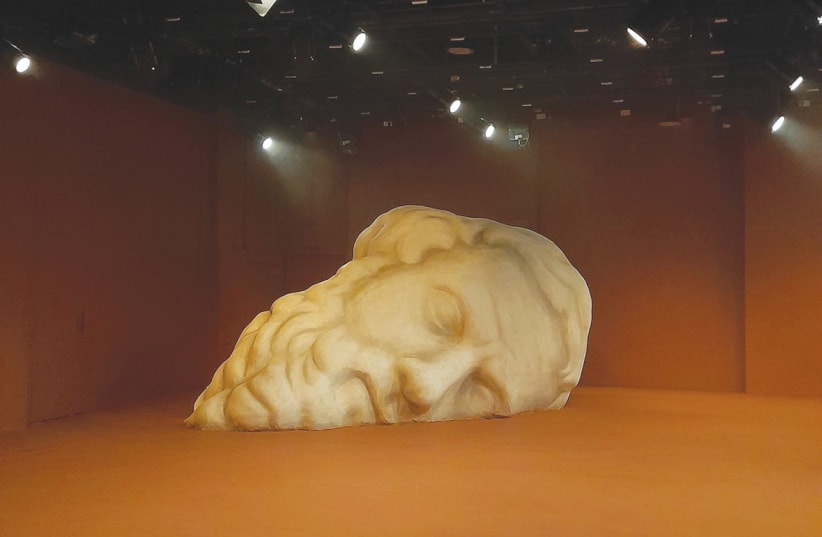A stunning head sculpted in the Greek style, partially submerged into the stage of the University Theater’s rendition of Euripides’ Electra, loomed above the audience.
Engaged in physical labor, a farmer named Amit Lasri was seen hoisting sacks of grain while his wife, portrayed by Maya Lapid as Electra, sat brooding on one of the sacks. As her brother Orestes, played by Rea Desheh, approached, the choir consisting of Shiri Blustein, Noa Millo, and Chen Kimhi Vardi, clad in khaki attire, observed his movements. Noteworthy were Orestes’ shoes, akin to Electra’s, distinguished by their white soles, while the rest donned boots. The lingering question remained: would she recognize him?
Translated by Shimon Buzaglo, Euripides’ Electra delves into the aftermath of Agamemnon’s absence. The patriarch, father to Electra and Orestes, met his demise in a treacherous act orchestrated by his wife, Clytemnestra (depicted by Hili Baruch Stern), and her paramour, Aegisthus. Electra was wed off to a farmer, and Orestes was clandestinely escorted out of the country by a faithful elderly servant, portrayed by Amit Braverman.
Upon Orestes’ eventual return to his ancestral abode, the narrative unfolds the dilemma of avenging his father by slaying Aegisthus, while grappling with the daunting task of confronting his own mother.
Buzaglo’s translation, characterized by its accessibility, offers insights like the old man’s reflection to Orestes, “Such is the nature of servants, they always look for the side with butter on it.” A comparison with Ian Johnston’s rendition, “that’s what slaves are like,” underscores the trade-off between ease of comprehension and nuanced expression.
In director Ilil Lev Kenaan’s adaptation, the absence of invocations to “Lady Earth” strips away some of the distinctive Greek elements, resulting in a more concise and relatable narrative.
The portrayal of the choir as three uniformed IDF soldiers, articulating societal perspectives, adds a visual dimension to the omitted textual nuances. Their encircling of Orestes during his contemplation of Apollo’s commands symbolizes the Greek ideals of shame, retribution, and public opinion, encapsulating the internal conflict plaguing Orestes.
Characters in the play
Lapid’s portrayal of Electra exudes a palpable intensity, contrasting her previous role in Dea Loher’s The Last Fire. Braverman’s portrayal of the elderly servant showcases a stark departure from his recent depiction of Reynald of Chatillon in The King of Jerusalem by Gilad Evron.
Lasri’s depiction of the farmer resonates with dignity and pragmatism, symbolizing the silent contributors to historical upheavals. Baruch Stern’s regal portrayal of Clytemnestra, juxtaposed with Electra’s subdued attire, conveys a wealth of narrative subtext in a single glance.
Euripides’ daring narrative, brought to life through the performances, challenges societal norms and gives voice to formidable female characters like Clytemnestra. The production, guided by director Efim Rinenberg, showcases the talents of students such as Kye Agin Peters and Naama Geffen in alternating roles.
Performance Details
Euripides’ Electra will be staged on Monday, March 4, Tuesday, March 5, and Wednesday, March 6, at 8 p.m. Tickets priced at NIS 30-50 are available exclusively in Hebrew language. The performance runs for 90 minutes without an intermission at the University Theater, Tel Aviv University Theater Arts Department. For ticket bookings, visit [https://bit.ly/tktstau/].
